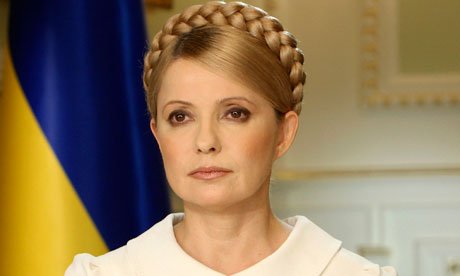Yulia Tymoshenko’s rights violated by Ukraine during pre-trial detention in 2011, ECHR rules
European Court of Human Rights (ECHR) has found that Ukraine’s pre-trial detention of former PM Yulia Tymoshenko in 2011 was illegal and her rights to a legal review and compensation were violated.
Yulia Tymoshenko, who is still in jail, also alleged physical mistreatment, but that complaint was not upheld by the ECHR.
The former prime minister was jailed for seven years for abuse of office over a gas deal.
Tuesday’s verdict does not overturn her prison sentence.
The ECHR will examine that verdict later, in a separate case.

ECHR has found that Ukraine’s pre-trial detention of former PM Yulia Tymoshenko in 2011 was illegal and her rights to a legal review and compensation were violated
According to the Associated Press, a Ukrainian government official stormed out of the courtroom after Tuesday’s ruling.
The judgment is not final as the parties involved have three months to lodge any appeal.
Yulia Tymoshenko did not enter any claims for damages.
She was a key figure in Ukraine’s 2004 Orange Revolution and went on to become prime minister twice.
In 2009, Yulia Tymoshenko signed a 10-year contract for the supply of Russian gas to Ukraine.
At her trial two years later, prosecutors argued that she had not obtained the approval of her cabinet to sign the deal, and that it had proved ruinous for the Ukrainian economy.
The Strasbourg-based ECHR found that Yulia Tymoshenko’s detention ahead of her trial had violated her right to liberty and security because it had been ordered for an indefinite period of time.
“No risk of absconding was discernible,” it said, noting that the former prime minister had not breached her obligation not to leave town or failed to attend a court hearing.
The Ukrainian trial judge, Rodion Kireyev, had ordered her to spend the trial in custody for contempt of court.
However, the ECHR judges ruled that this “reason was not included among those which would justify deprivation of liberty”.
The ECHR also ruled that Ukraine’s judiciary lacked a procedure for reviewing the detention of suspects.
A complaint that Yulia Tymoshenko had been denied proper medical treatment in detention was thrown out by the ECHR judges.
On the contrary, they found that the local authorities “had invested efforts far beyond the normal healthcare arrangements available for ordinary detainees in Ukraine”.
They also threw out an allegation that Yulia Tymoshenko had been beaten during a transfer from prison to hospital in April 2012, pointing out that she had refused to undergo a full forensic examination at the time.
Though the ECHR did not rule on the legality of Yulia Tymoshenko’s actual conviction, her daughter Yevgenia hailed the verdict as the “first victory” on the way to her release.
“Today we are saying that this is the first victory, the first step to her full political rehabilitation and her immediate release,” she told reporters in the Ukrainian capital, Kiev.
